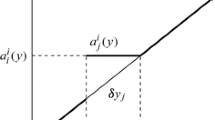Abstract
We formulate and study a general finite-horizon bargaining game with simultaneous moves and a disagreement outcome that need not be the worst possible result for the agents. Conditions are identified under which the game is dominance solvable in the sense that iterative deletion of weakly dominated strategies selects a unique outcome. Our analysis uses a backward induction procedure to pinpoint the latest moment at which a coalition can be found with both an incentive and the authority to force one of the available alternatives. Iterative dominance then implies that the alternative characterized in this way will be agreed upon at the outset—or, if a suitable coalition is never found, that no agreement will be reached.
Similar content being viewed by others
References
Abreu D., Gul F.: Bargaining and reputation. Econometrica 68(1), 85–117 (2000)
Banks J.S., Duggan J.: A bargaining model of collective choice. Am Polit Sci Rev 94(1), 73–88 (2000)
Baron D.P., Ferejohn J.A.: Bargaining in legislatures. Am Polit Sci Rev 83(4), 1181–1206 (1989)
Blackwell D.H., Girshick M.A.: Theory of Games and Statistical Decisions. Wiley, New York (1954)
Brandenburger A.M., Keisler H.J.: Epistemic conditions for iterated admissibility. In: Benthem, J. (eds) Theoretical Aspects of Rationality and Knowledge: Proceedings of the Eighth Conference, pp. 31–37. Morgan Kaufmann, San Francisco (2001)
Chatterjee K., Samuelson L.: Perfect equilibria in simultaneous-offers bargaining. Int J Game Theory 19(3), 237–267 (1990)
Cho S., Duggan J.: Bargaining foundations of the median voter theorem. J Econ Theory 144(2), 851–868 (2009)
Dekel E.: Simultaneous offers and the inefficiency of bargaining: a two-period example. J Econ Theory 50(2), 300–308 (1990)
Ewerhart, C.: Ex-ante justifiable behavior, common knowledge, and iterated admissibility. Unpublished manuscript, University of Bonn (2002)
Fudenberg D., Tirole J.: Game Theory. MIT Press, Cambridge (1991)
Gretlein R.J.: Dominance solvable voting schemes: a comment. Econometrica 50(2), 527–528 (1982)
Gretlein R.J.: Dominance elimination procedures on finite alternative games. Int J Game Theory 12(2), 107–113 (1983)
Kennan J., Wilson R.B.: Bargaining with private information. J Econ Lit 31(1), 45–104 (1993)
Kreps D.M.: A Course in Microeconomic Theory. Princeton University Press, Princeton (1990)
Marx L.M., Swinkels J.M.: Order independence for iterated weak dominance. Games Econ Behav 18(2), 219–245 (1997)
Moulin H.: Dominance solvable voting schemes. Econometrica 47(6), 1337–1351 (1979)
Myerson R.B.: Incentive compatibility and the bargaining problem. Econometrica 47(1), 61–74 (1979)
Nash J.F. Jr: Two-person cooperative games. Econometrica 21(1), 128–140 (1953)
Perry M., Reny P.J.: A non-cooperative bargaining model with strategically timed offers. J Econ Theory 59(1), 50–77 (1993)
Rubinstein A.: Perfect equilibrium in a bargaining model. Econometrica 50(1), 97–110 (1982)
Sákovics J.: Delay in bargaining games with complete information. J Econ Theory 59(1), 78–95 (1993)
Simsek, A., Yildiz, M.: Durable bargaining power and stochastic deadlines. Unpublished manuscript, Massachusetts Institute of Technology (2008)
Smith, L., Stacchetti, E.: Aspirational bargaining. Unpublished manuscript, University of Michigan (2003)
Ståhl I.: Bargaining Theory. Stockholm School of Economics, Stockholm (1972)
Sutton J.: Non-cooperative bargaining theory: an introduction. Rev Econ Stud 53(5), 709–724 (1986)
von Mises L.: Human Action. Contemporary Books, Chicago (1966)
Author information
Authors and Affiliations
Corresponding author
Additional information
The work reported here has been supported by the National Science Foundation, the Stanford University Graduate School of Business, and Nuffield College, Oxford. The author also wishes to thank Margaret Meyer, Eric Van den Steen, Robert Wilson, Muhamet Yildiz, and four referees for useful comments and suggestions.
Rights and permissions
About this article
Cite this article
Tyson, C.J. Dominance solvability of dynamic bargaining games. Econ Theory 43, 457–477 (2010). https://doi.org/10.1007/s00199-009-0454-0
Received:
Accepted:
Published:
Issue Date:
DOI: https://doi.org/10.1007/s00199-009-0454-0




